Driving Safety
Put It Down: Focus On Driving
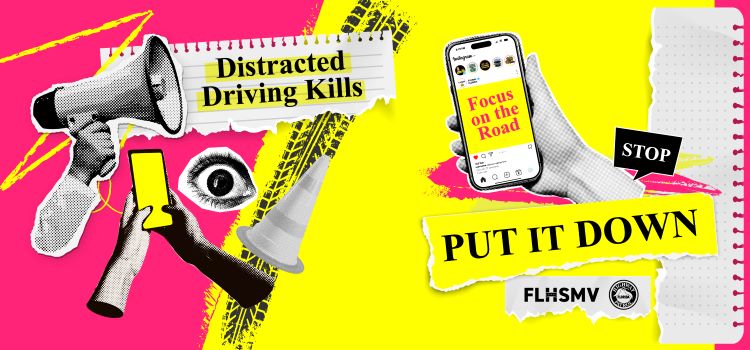
The Florida Department of Highway Safety and Motor Vehicles is partnering with law enforcement partners and other agencies to educate Floridians about the importance of avoiding distracted driving with the Put It Down: Focus on Driving campaign. The Wireless Communications While Driving Law, section 316.305, Florida Statutes, took effect on July 1, 2019. This law requires drivers to put their phones down and focus on driving.
What is the Wireless Communications While Driving Law?
Section 316.305, Florida Statutes allows law enforcement to stop motor vehicles and issue citations to motorists that are texting and driving. A person may not operate a motor vehicle while manually typing or entering multiple letters, numbers or symbols into a wireless communications device to text, email and instant message.
Section 316.306, Florida Statutes, is a prohibition on using wireless communications devices in a handheld manner in school and work zone. A person may not operate a motor vehicle while using a wireless communications device in a handheld manner in a designated school crossing, school zone or active work zone area. Active work zone, as it pertains to Section 316.306, Florida Statutes, means that construction personnel are present or are operating equipment on the road or immediately adjacent to the work zone area.
What is Distracted Driving?
Distracted driving is anything that takes your hands off the wheel, your eyes off the road or mind off driving. It is extremely risky behavior that puts everyone on the road in danger. There are different kinds of driver distractions:
Types of Driver Distraction |
|
|---|---|
Visual | Taking your eyes off the road |
Manual | Taking your hands off the wheel |
Cognitive | Thinking about anything other than driving |
Texting requires all three types of distraction, making it one of the most dangerous of distracted driving behaviors. However, this is not the only cause of distracted driving. Other common distractions include: tending to kids or passengers in the back seat, eating, watching an event outside of the vehicle, interacting with passengers, unsecured pets, putting on makeup or grooming, adjusting radio or climate controls, checking your GPS app or daydreaming.
To successfully avoid a crash, a driver must perceive a hazard, react and give the vehicle time to stop. Driver perception distance, or the distance a vehicle travels from the time a driver sees a hazard until the brain recognizes it, and reaction distance, the distance a car will continue to travel after seeing a hazard until the driver physically hits the brakes, dramatically affects a vehicle’s stopping distance. Even a focused driver going 50 mph will travel nearly the length of a football field before coming to a complete stop.
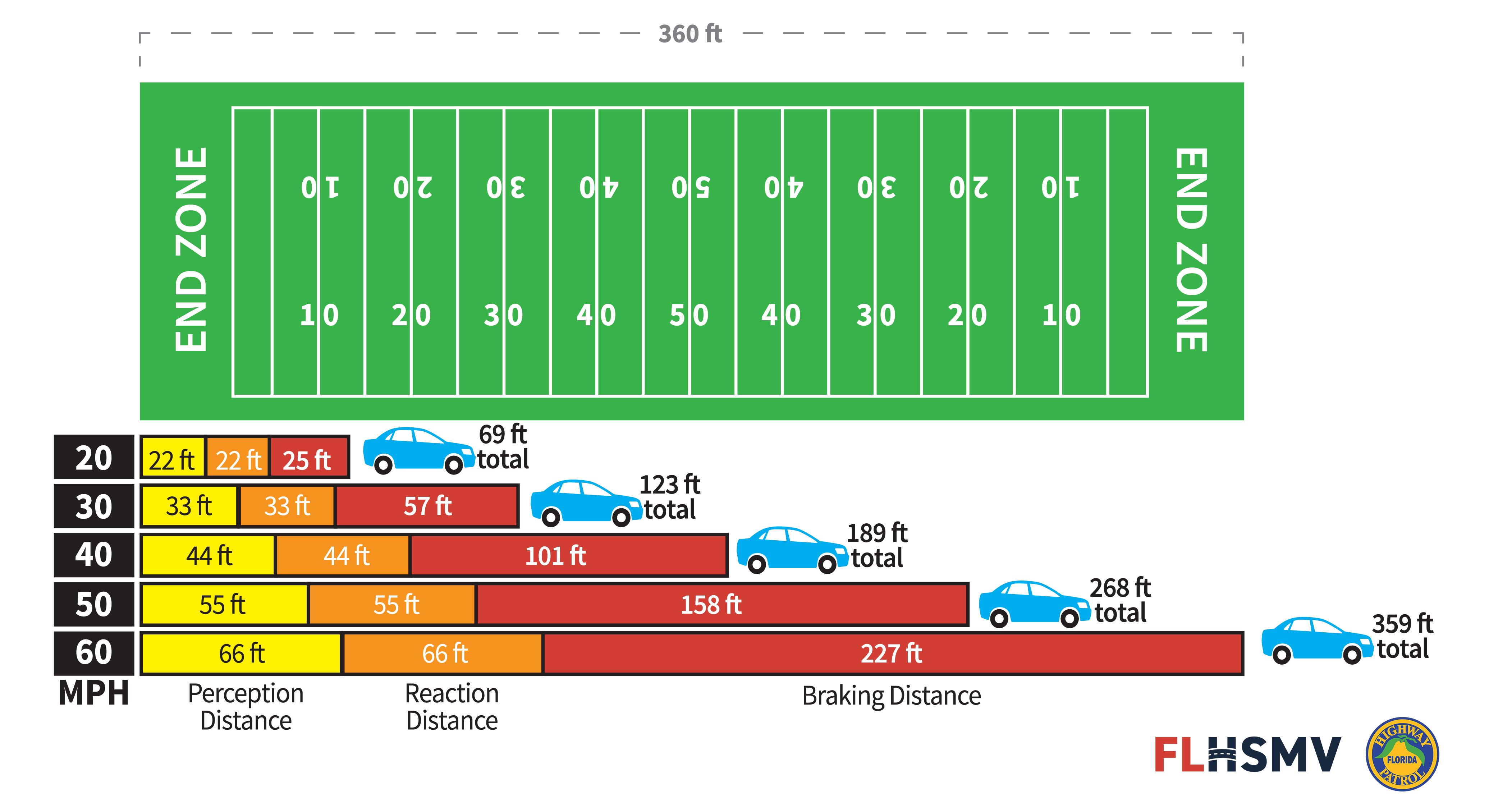
When a driver is not focused on the road, it limits their ability to come to a stop and avoid a crash.
The Florida Department of Highway Safety and Motor Vehicles and Florida Highway Patrol remind all drivers to keep your eyes on the road and Focus on Driving to ensure everyone can Arrive Alive!
Frequently Asked Questions
-
When did the law go into effect?
Section 316.305, Florida Statutes, went into effect on July 1, 2019. Motorists can be stopped and cited for texting and driving. The second part of the law, section 316.306, Florida Statutes, went into effect on October 1, 2019, in which a motorist can be pulled over and issued a warning for using wireless communications devices in a handheld manner in school and work zones. As of January 1, 2020, motorists can be issued a citation for not using a device in a hands-free manner in school and work zones.
-
What does wireless communications device mean?
Wireless communications device means any handheld device capable of being used in a handheld manner, that is designed or intended to receive or transmit text or character-based messages, access or store data, or connect to the Internet or any communication service and that allows text communications. This includes a cell phone, tablet, laptop, two-way messaging device, or an electronic game that can be used in a handheld manner.
-
What are the penalties for not complying with the law?
For texting and driving, section 316.305, Florida Statutes:
FIRST OFFENSE
is a non-moving traffic violation with a base $30 fine, not including additional court costs or other fees, and no points assessed against the driver license.
SECOND OFFENSE
within five years is a moving traffic violation, with a base $60 fine, not including court costs and other fees, and 3 points assessed against the driver license.
For not using a device hands-free in a school zone and work zone, section 316.306, Florida Statutes:
ANY OFFENSE
is a moving traffic violation, with a base $60 fine, not including court costs and other fees, and 3 points assessed against the driver license.
-
Are there any exceptions?
A motor vehicle that is stationary is not being operated and is not subject to the prohibition in the law.
Per section 316.305, Florida Statutes, the law also does not apply to a motor vehicle operator who is:
- Performing official duties as an operator of an authorized emergency vehicle (law enforcement, fire service or emergency medical services professional).
- Reporting an emergency or criminal or suspicious activity to law enforcement authorities.
- Receiving messages that are: related to the operation or navigation of the motor vehicle; safety-related information, including emergency, traffic, or weather alerts; data used primarily by the motor vehicle; or radio broadcasts.
- Using a device or system for navigation purposes.
- Conducting wireless interpersonal communication that does not require manual entry of multiple letters, numbers, or symbols, except to activate, deactivate, or initiate a feature or function.
- Conducting wireless communication that does not require reading text messages, except to activate, deactivate, or initiate a feature or function.
- Operating an autonomous vehicle in autonomous mode.
Per section 316.306, Florida Statutes, the law is only applicable to work zone areas if construction personnel are immediately present or are operating equipment on the road or immediately adjacent to the work zone area. The law also does not apply to a motor vehicle operator who is:
- Performing official duties as an operator of an authorized emergency vehicle (law enforcement, fire service or emergency medical services professional).
- Reporting an emergency or criminal or suspicious activity to law enforcement authorities.
- Receiving messages that are: related to the operation or navigation of the motor vehicle; safety-related information, including emergency, traffic, or weather alerts; data used primarily by the motor vehicle; or radio broadcasts.
- Using a device or system in a hands-free manner for navigation purposes.
- Using a wireless communications device hands-free or hands-free in voice-operated mode, including, but not limited to, a factory-installed or after-market Bluetooth device.
- Operating an autonomous vehicle in autonomous mode.
Press Release: 2025
Resources
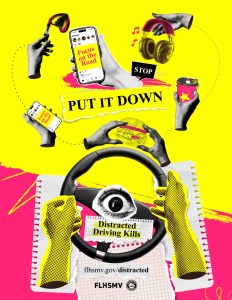
8×11 Poster
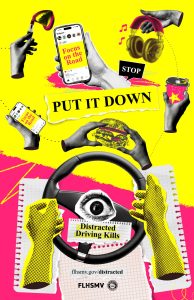
11×17 Poster

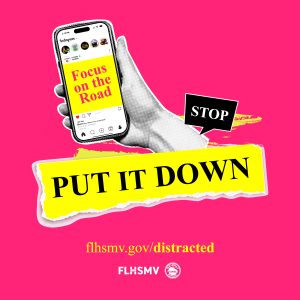
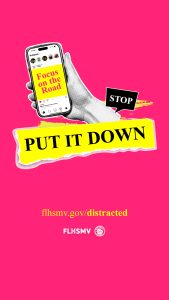
Dave Kerner, Executive Director